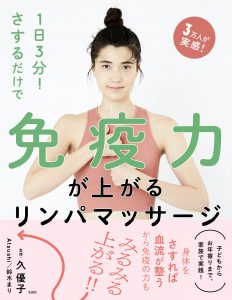Vol.3「良質な睡眠」
Column|2025.6.24
Text_Yuko Hisashi
コロナから働き方や生活、人との関わりが大きく変わりました。
S N Sから24時間365日様々なジャンルの情報が必要な時に必要なだけ得られるようになり、コミニュケーションツールとしてスマホは肌身離さず持つようになり、スマホ依存なんて言葉もよく耳にするようになりました。
その反面、デジタルデトックスなんていう言葉も出現しました。
パソコンやスマホの使いすぎが及ぼす体への悪影響…
ブルーライトによる目の疲れ・頭痛・肩こり・ドライアイ。もっと恐ろしいのは体内時計が狂い生活リズムが乱れたり、睡眠の質を低下させたり、情報過多によるストレスによって、脳が疲労し、記憶力と判断力の低下につながる。そして忘れてはいけないのが電磁波。でも体に悪いからといって、パソコンもスマホも使わないってことは現代を生きている私たちにとっては到底無理な話。
でも改めて体への悪影響を考えるとこのまま使い続けるのはいかがなものかと思う。
そこでこのような事実を受け止め、ブルーライトによる悪影響については、パソコンやスマホを暗いところで見ないことや画面を凝視しないように心がける。情報過多でストレスにならないよう、正しい知識を身につけること、睡眠の質・睡眠時間の確保をする工夫を意識的にしてみませんか?
身近なこととしてすぐに生活に取り入れられる「睡眠」があります。「睡眠」には、日中の活動で疲れた身体を休ませ、疲労を回復させる働き、細胞の修復させる働きなどがあります。また、脳の休養と疲労回復にも必要で、記憶を整理して定着させたり、精神状態を健やかに保ったりする働きもあるのです。
さらに、睡眠には休養のほかにも、自律神経やホルモン分泌を正常に保ち、免疫力を高めるなど多くの働きがあります。また、良好な睡眠をとっている人は肥満になりにくいことや、糖尿病、高血圧、脂質異常症、脳卒中、心疾患などの生活習慣病のリスクが低くなることも知られています。
そう考えると良質な睡眠を取ることは、健やかな体を保つためにとても重要なことがわかると思います。まずは私が実践しているのは、寝る前1〜2時間はパソコンやスマホに触れないこと。仕事上、メッセージなどの返信をすることがあっても⻑時間画面を見ないようにし、寝る時にはスマホを寝室に持ち込まないようにしています。
そしてベッド周辺ではなるべく電磁波の影響を受けないようコンセントからプラグを抜く、電磁波カットのネックレスなど着用して寝るなどし、意識しています。また良質な睡眠を取るために、深部体温のリズムを調整します。深部体温が低下することでスムーズに眠りに入ることができるため、寝る2〜3時間前にお風呂に入ります。お風呂に入ることで一旦深部体温を上げ、次第に下がっていき、変化が大きくなった時がスムーズに眠りに入る絶好のタイミングなのでその時にはベッドで横になるようにします。
実践してから一番変わったのは寝起きの感覚。「脳」がクリアというか、目の奥がクリアというか、目覚めが変わりました。
このように私たちの体の持つメカニズムを知った上で、ライフスタイルを変える・取り入れることで時代の変化にも柔軟に順応できる体作りが少しでもできるようになるんだと実感しました。
体に悪いものはなるべく排除できるように心がける気持ちを持つことでQOL向上にもつながると思います。
Well-Being, Today and Every Day
Since the COVID-19pandemic, how we work, live, and connect has changed dramatically.
With social media available 24/7, we can access information anytime, and smartphones havebecome essential—so much so that terms like“smartphone addiction”and“digital detox”arenow part of everyday language.
Overuse of digital devices can cause eye strain, headaches, stiff shoulders, and dry eyes fromblue light. More seriously, it disrupts our biological clocks, lowers sleep quality, and stressesthe brain—affecting memory and judgment. Electromagnetic waves are also a concern. Butrealistically, we can’t just stop using computers and smartphones, no matter how bad theymay be for our bodies. Still, continuing without change feels irresponsible.
Personally, to mitigate the negativeeffects of blue light, I avoid using computers orsmartphones in dimly lit areas and try not to stare intently at screens. To prevent informationoverload and stress, how about acquiring accurate knowledge and making an effort to improvethe quality and quantity of our sleep?
“Sleep” can easily be made part of our lives. It helps rest the body after daily activity, recoverfrom fatigue, and repair cells. It is also essential for the brain—consolidating memory,refreshing the mind, and maintaining emotionalbalance.
Beyond rest, sleep also regulates autonomic functions, supports hormonal balance, andstrengthens the immune system. Good sleep lowers the risk of lifestyle diseases like obesity,diabetes, and heart disease. Clearly, good sleep is key to good health.
I avoid screens for1–2hours before bed, limit late-night screen use for work, and keep myphone out of the bedroom.
To reduce electromagnetic exposure, I unplug nearby cords and wear an EMF-protectionnecklace. I also manage my core body temperaturerhythm to improve sleep quality. Becausea drop in core body temperature leads to better sleep, I take my bath two to three hours beforebed. The bath raises my temperature, which then gradually drops—creating the ideal momentto drift off to sleep, so Imake sure to be in bed by then.
The biggest change I’ve noticed is how I wake up—my mind and eyes feel clear.This experience made me realize that by learning how our bodies work and adjusting ourlifestyles accordingly, we can better adapt to our rapidlychanging world, and by being mindfulto eliminate things that are bad for our body, we can improve our quality of life.
久 優子|Hisashi Yuko

ボディメンテナンスサロン「美・Conscious」代表。
⼀般社団法⼈⽇本ホリスティックウェルネス協会 代表理事。
脚のパーツモデルを経て、ホリスティック医学第⼀⼈者である、帯準良⼀医師に師事。
予防医学健康美協会・⽇本リンパセラピスト協会・⽇本痩⾝医学協会・未病プラン協会で認定を受け講師として活動。
その後もさまざまな分野で独⾃の研究を重ね、現在のボディメンテナンスメソッドを確⽴。
著者:「1日3分!足首まわしで下半⾝がみるみるヤセる」(PHP研究所)「脚からみるみるやせる2週間レシピ」「押したら、やせた。」
「1⽇3分!さするだけで免疫⼒が上がるリンパマッサージ」(共に宝島社)、「下半⾝からみるみるやせるおうちダイエットBOOK」(講談社)など多数。
累計部数32万部になる。
未病対策・⾝体のメカニズムやリンバ&⾎液の流れを整えるセルフケアなどの講座も開催。
http:///www.instagram.com/yukohisashi





